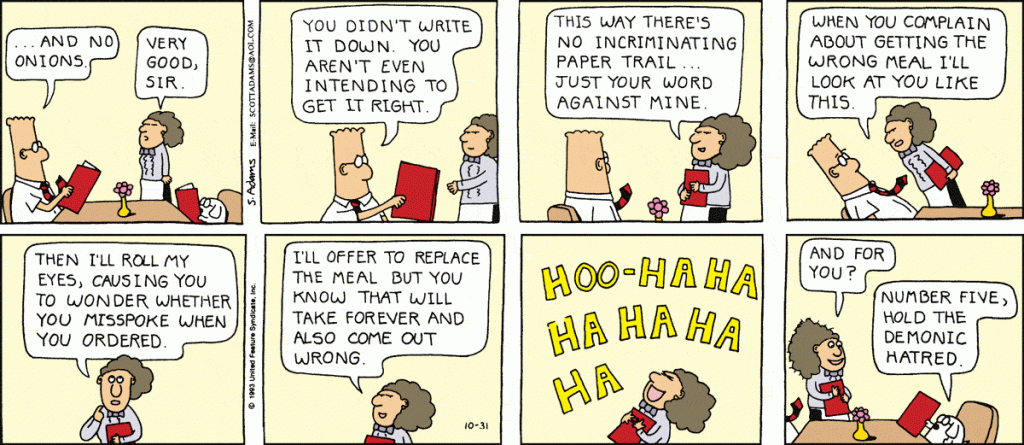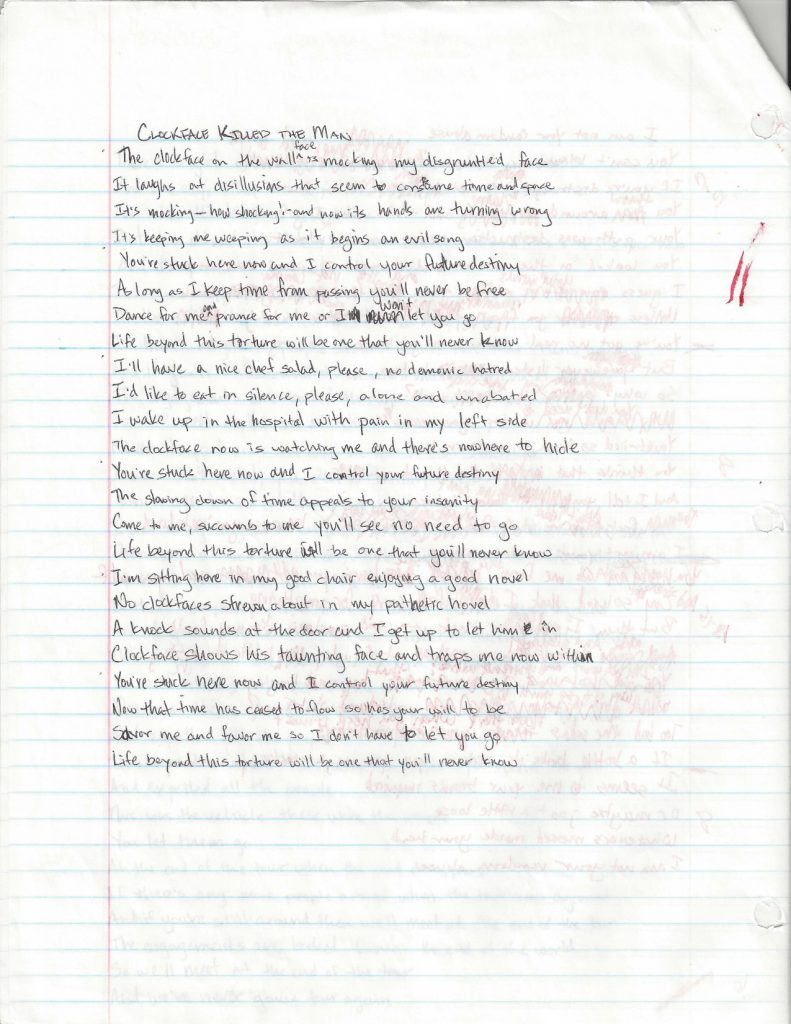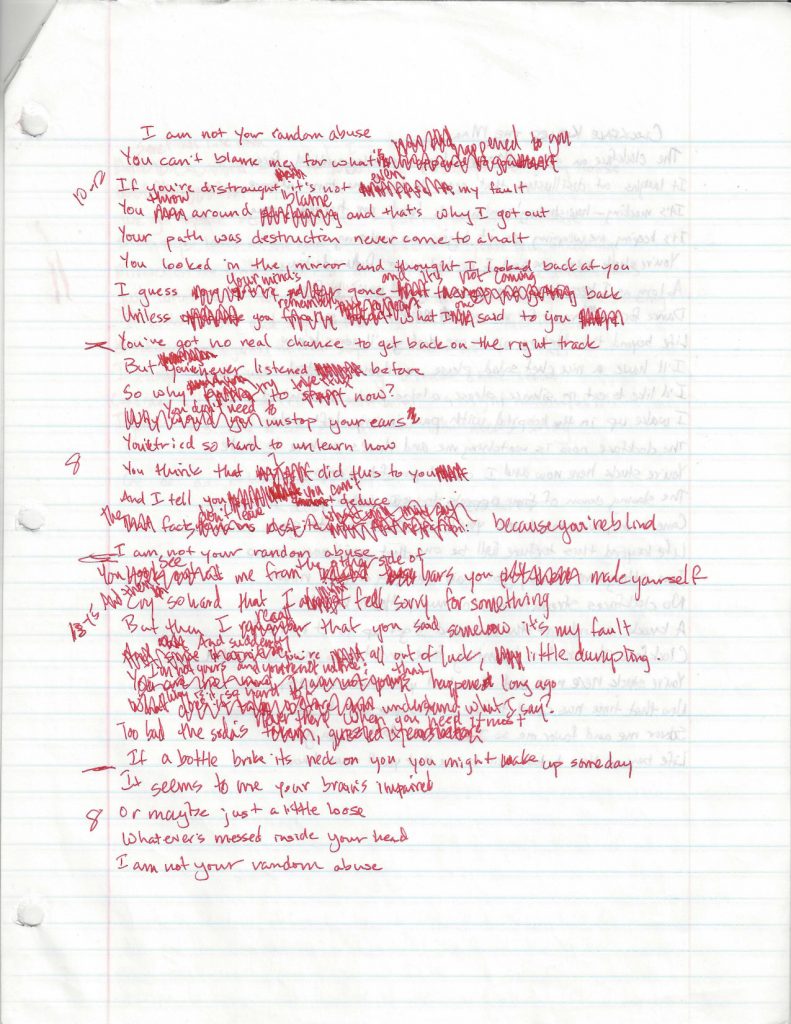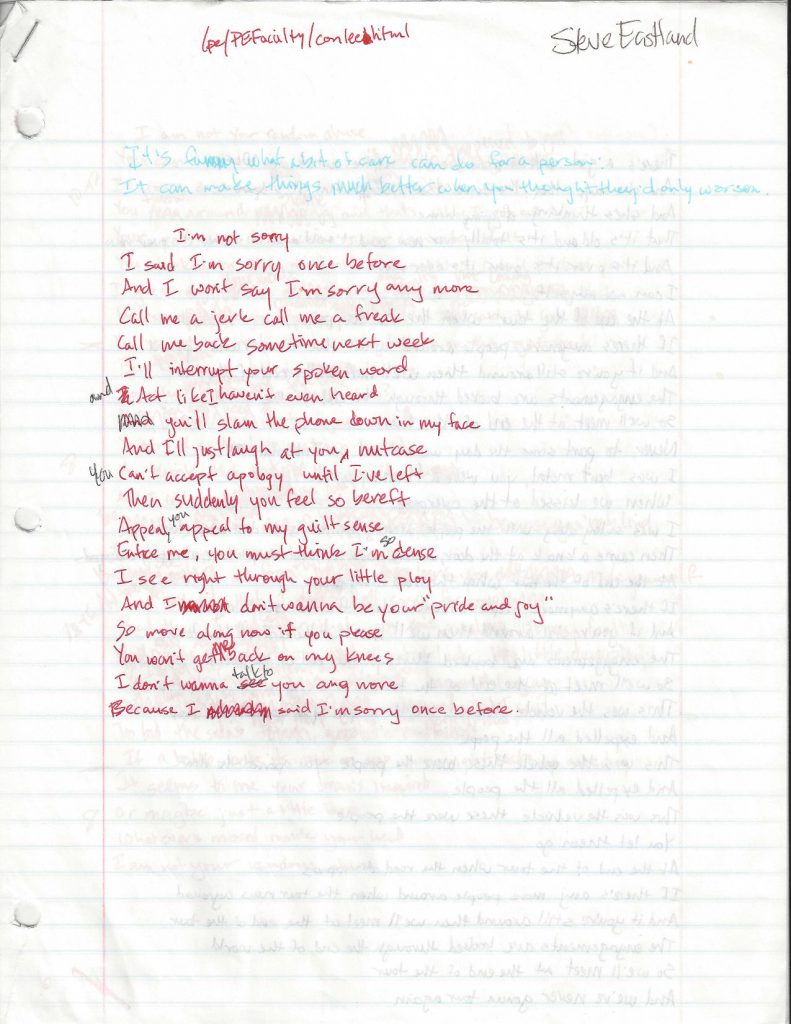The poem in question: Clockface Killed The Man
This is another poem that I wrote in class at BYU, this time in a Computer Science class. As I recall, it was an 8 a.m. class, and I never have been, nor do I suspect I ever will be, an 8 a.m. person. Also, the lecture was boring that day, and as I kept looking at the clock, a “Calvin and Hobbes” strip came to mind:

In my poem, the clock is anthropomorphized (a word I learned from another “Calvin and Hobbes” strip) as the entity Clockface. I don’t know if he is straight-up evil, but he undoubtedly relishes in the misery of people when time is not flying. When I envision Clockface, I picture a Mirror Universe amalgam of Cogsworth (from Disney’s “Beauty and the Beast”) and T.T. (from the Nintendo64 game “Diddy Kong Racing”). He probably has a goatee.
The person in the poem just wants to live life on his or her own terms, without the constrictions of where to be, when, and for how long. Of course Clockface insists on butting in and screwing those plans right up.
The beginning of the second verse (third stanza) is a reference to a “Dilbert” comic strip, back when it was still funny:

I have no idea how my poetic salad caused a hospital admission, but it seemed funny at the time, too.
This poem was meant to be a silly poking of fun at the passage of time, but at this point in my life I find a more ironic meaning the progression of the things Clockface says:
Dance for me and prance for me or I won’t let you go
…
Come to me, succumb to me; you’ll see no need to go
…
Savor me and favor me so I don’t have to let you go
As a younger man I was always looking forward to the next thing. I still do that now, twenty-and-more years later, but I am more keenly aware of my own mortality. Of course time cannot forever contain us; it’s Clockface’s lie to keep us eager for the future, without actually savoring the precious moments we are currently experiencing. We will inevitably arrive in the future regardless of our current state, so we should make the most of what we have now.
That isn’t to say the the present is always nice, and sometimes the future is all we have to look forward to when the right now is made bleak by forces beyond our control. But by selling us his lie of making the passable, and even pleasant, present seeming unbearable, Clockface steals from us the one thing we can never recover.
He definitely has a goatee.
As far as the writing style, I don’t have much to say except that one thing bothers me. In each of the “choruses” (stanzas 2, 4, and 6), the beginning of the third line has a little rhyme, (“dance for me and prance for me,” “come to me, succumb to me,” and “savor me and favor me”). I think it works nicely. However, the first verse (first stanza) also has a similar rhyme (“it’s mocking–how shocking!”), and I like it, but I did not replicate the pattern for the second and third verses (stanzas 3 and 5). I think it sticks out a bit.
Finally, when I read Clockface’s repeated line
Life beyond this torture will be one that you’ll never know
In my head, I hear “this torture” as sung by John Linnell of They Might Be Giants in “Don’t Let’s Start”:
D, world destruction
Over an overture
N, do I need
Apostrophe T, need this torture?
Here is the original handwritten version, largely unchanged from initial scrawl to finished copy:



Poetism Commentary: “Something Broken”
The poem in question: Something Broken
When I was about 13, my older cousin recommended The Chronicles of Thomas Covenant the Unbeliever to me. I probably shouldn’t have read them till I was a little older, but to this day they remain some of my absolute favorite books. The Second Chronicles of Thomas Covenant are also very good, and I’ve read the first and second Chronicles several times. The story and characters had such an impact on me that my wedding ring is made of white gold (Thomas Covenant’s white gold wedding ring is a fundamental element of the tale).
Unfortunately, I didn’t like The Last Chronicles of Thomas Covenant, and I just pretend they don’t exist. Maybe I’ll read them again one day and see if I change my mind.
Anyway, in The Wounded Land, the first book of The Second Chronicles of Thomas Covenant, Thomas Covenant says to another primary character,
That line stuck with me, and I wanted to write something based on the words “something broken,” which is how this poem came about. Despite its flaws, it’s one of my favorite poems that I have written. I was quite passionate about it, and I think it turned out pretty well. I also call it my “D” poem, becausemany of the words start with D. (Get it? GET IT?!)
My “Something Broken” isn’t about a man who’s lost everything, but rather about someone who is continually making poor choices without regard to consequence. It was written from an LDS perspective—as I mentioned some time ago in the commentary for Stormy Weather,
The subject of Something Broken—the friend—has taken this path and is beginning to suffer the consequences:
But now that he’s lost, he doesn’t see a possible way back and is contemplating suicide as a plausible “out.” This is evidenced by wandering the rooftop alone, and (maybe my favorite lines from the poem):
In this case, suicide is not the way out, it’s just furthering the devil’s victory, but that isn’t easy to realize.
The speaker of the poem hasn’t given up on him, though. One interpretation of the speaker’s identity is Jesus, though really it could be anyone. The line
Seems to me like it could easily be misinterpreted. It’s not that the speaker will give up on his friend, becoming an enemy; rather the lost soul will feel so uncomfortable in his presence that it will simply feel that way to him.
The superficial “something broken” is finally revealed in the final line. The “broken crown” represents the promised reward from Satan that is ultimately worthless. However, the real “something broken” is the lost soul. But the speaker understands that he can come back, and it may be hard, but worth it.
Setting aside the LDS view (since I no longer subscribe), I think it works well enough as cautionary tale of downward spiral. And though I wrote this a few years before The Lord of the Rings movies were released, the line
Now reminds me of something Sam says to Frodo as they lay shivering in Mordor, near the end of The Return of the King. Sam looks up at the sky and sees a brief break in the clouds, and says,
Tolkien’s original text is even better:
The light may be hidden from us at times, but it is always there, waiting to be rediscovered.
Some notes on the original handwritten version, seen below:
The scribbled-out “D’s poem” at the top refers to two different things. Firstly, as mentioned earlier, I call this my “D” poem, but I also have a friend who has a sister whose name begins with “D.” People often called her “D” in lieu of her name. Around the time I wrote this poem, she was also at BYU, and I would often see her around the time of my HEPE class, as it was in the same building as the university swimming pools, and she was a swimmer who apparently practiced around that time.
Next, I can’t decipher all of them, but some of the scribbled-out lines are:
I think we can all agree those lines are terrible. A few of the revised lines from the made it to the printed copy from my old web site, before becoming the final published version:
They are better, but I definitely prefer the final version. And as a final note, although Something Broken will remain as currently published, I offer the following replacement for the final line: